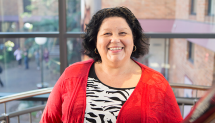The effectiveness of 'trauma-informed care' and healing programs will be at the forefront of a new research project studying Aboriginal and Torres Strait Islander family and domestic violence and sexual assault (FDVSA) programs.

Professor Bronwyn Carlson, Head of the Department of Indigenous Studies at Macquarie University
The new project, a partnership between Australia's National Research Organisation for Women's Safety (ANROWS) and researchers from the Department of Indigenous Studies at Macquarie University, will map and analyse "what works" in Aboriginal and Torres Strait Islander healing programs that respond to FDVSA nationally.
In recent years there has been considerable inquiry into the cause and impact of family, domestic and sexual violence in Aboriginal and Torres Strait Islander communities. However, many researchers have assumed that the factors involved are the same as those driving violence against women in the non-Indigenous population.
"Research now shows that violence experienced by Aboriginal and Torres Strait Islander women should also be understood in the context of the continued trauma of colonisation," said Professor Bronwyn Carlson, Head of Macquarie University's Department of Indigenous Studies.
The new project, led by Professor Carlson, will examine programs and initiatives that use a trauma-informed approach to healing, often known as healing programs.
" the ongoing trauma of colonisation experienced Aboriginal and Torres Strait Islander people," continued Professor Carlson. "Trauma manifests itself in many ways but includes internalising feelings of shame. There is a lot of unresolved pain and dysfunction that impacts families and children, resulting in what is commonly referred to as intergenerational trauma".
"This is the context in which we have to understand domestic, family, and sexual violence experienced by Aboriginal and Torres Strait Islander people. It's a context of both historical and ongoing colonial violence."
This study will build a better understanding of how healing programs reduce FDVSA in this context. While a number of studies have evaluated "what works" in Aboriginal and Torres Strait Islander healing programs across the nation, this is the first study with a specific focus on healing programs that respond to FDVSA. "Importantly, it will also expand the evidence base for the development of trauma-aware, healing-informed policy and practice" said ANROWS CEO Dr Heather Nancarrow.
The research team will investigate these programs by administering a national survey of healing programs as well as 13 in-depth case studies, to explore how trauma-informed practices are implemented, the strengths and challenges of the programs, and their outcomes and impacts.
Each case study will include yarning circles with service staff and Aboriginal and Torres Strait Islander women, including LGBTQIA+ women and those with disability. In some locations there will also be a yarning circle for men.
The project will be guided by a Knowledge Circle of Aboriginal and Torres Strait Islander experts and leaders in the field, including members from Aboriginal and Torres Strait Islander healing and FDVSA peak bodies.






